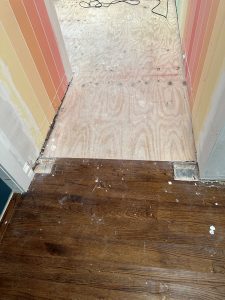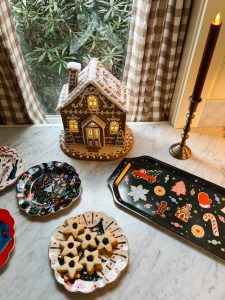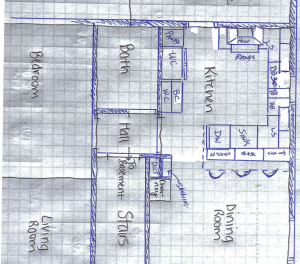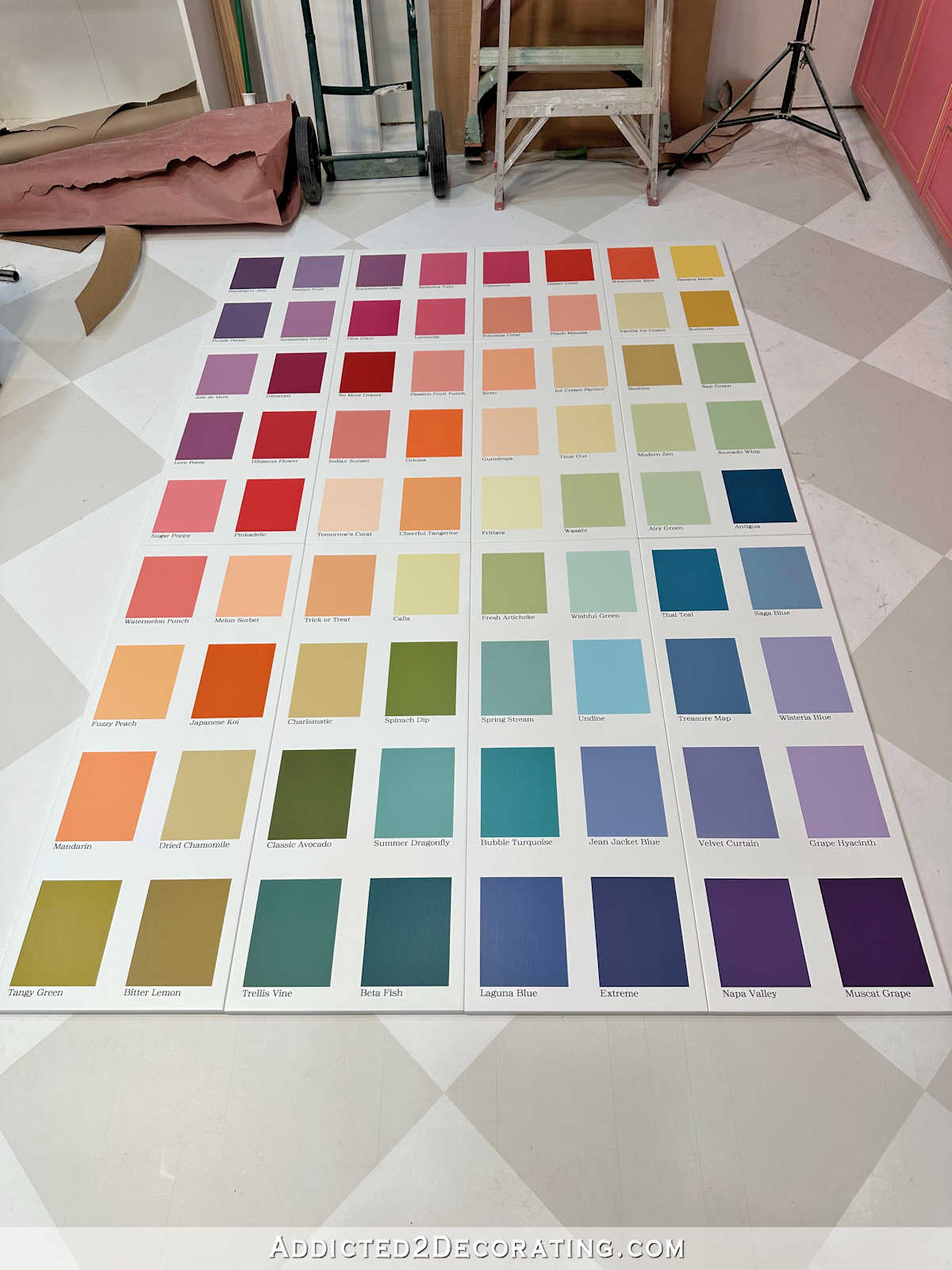
The cabinet doors for my 72-color paint swatch cabinet in the studio are finished. I thought this was going to be such a long, drawn out project, but this turned out being much faster and easier than my pink gold-leafed cabinets on the mural wall of the studio, and that’s even with me having to mix 33 of the colors myself.
Here’s how they turned out. It’s kind of hard to tell, but there are 12 cabinets doors there…
And here’s a closer look so that you can see the paint names under the colors…

I’m so excited about how these turned out! And I cannot wait to get the cabinet boxes all installed and trimmed out so that I can get the doors attached and see how the finished cabinet looks. The one thing I still remain undecided on is cabinet hardware. I have no clue what type of door pulls I should use on these that won’t interfere too much with the design.
One more thing. You’ll notice that mine turned out quite a bit different from my original inspiration cabinet. If you know me but at all, that should have been expected. 🙂 While I loved the more carefree brushed design of the original with the handwritten labels, and while I started this project intending to copy those same details, I realized as I got into this project that I had to be true to who I am.
I tend towards things that are neat, put together, tailored, precise, etc. That’s just who I am, so I had to be true to me. I think I would have enjoyed the more carefree look for a while, but I think it would have gotten old for me very quickly. It would have frustrated my brain after a short while, if that makes sense. I knew that the neat, clean, precise look is what I personally would enjoy more. And I’m actually glad it worked out that way. While I love getting inspiration from others, I do like to put my own personal spin in projects so that I’m not just outright copying other people.
Okay, let’s get on with the actual project and let me show you how I did it. After determining the 72 colors I wanted to use, finalizing the order I wanted them in, and mixing 33 of those colors myself (all of which I covered in Part 1 of this project), I was finally ready to start painting the colors onto the cabinet doors.
First, I started off by taping the rectangles on the fronts of my 12 IKEA Veddinge cabinet doors. I used two widths of tape — the purple 1.5″ tape, and the blue 1″ tape — to get the design to look just like I wanted it. In order to get the spacing just right on my doors, I made my rectangles about 7″ high, and allowed about 3 inches of space between the rows. That spacing allowed the design to fit perfectly onto the three different sizes of cabinet doors I used — 20″ doors on the top row, 30″ doors on the middle row, and 40″ doors on the bottom.
Once everything was taped, I went back and pressed the tape down very securely, and then sealed the edges of the tape with the base color (Behr Polar Bear) so that the colors wouldn’t bleed under the tape and I would have perfectly sharp edges.
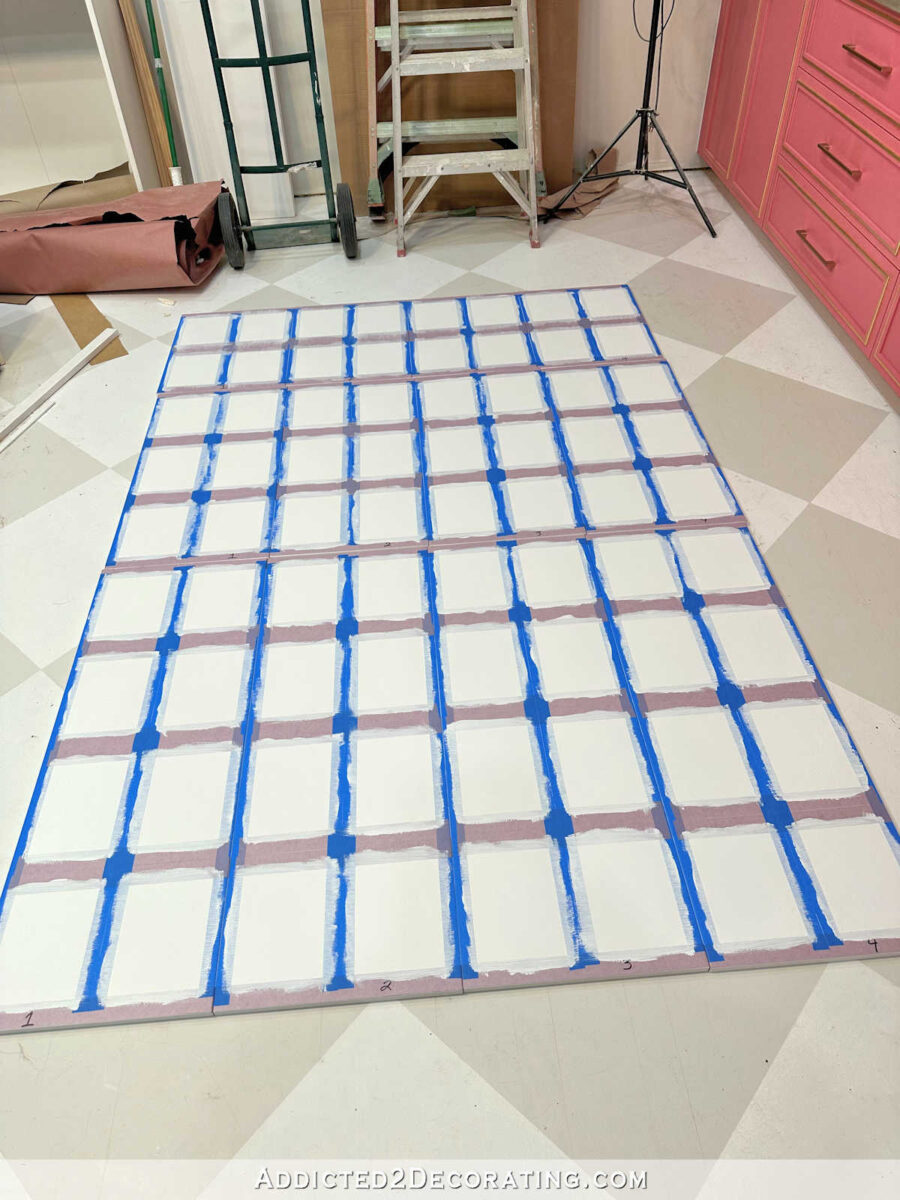
Hopefully you can see the tape details a little better with this closeup. I used two pieces of purple (1.5″) tape to separate the rows, and two pieces of blue (1″) tape to separate the columns.

Next, I took my 72 paint cards and placed them on the doors in the order I wanted them to appear. The paint cards were already numbered in the correct order, and I had numbered all of the paint containers to correspond with the paint cards so that there would be no room for confusion.
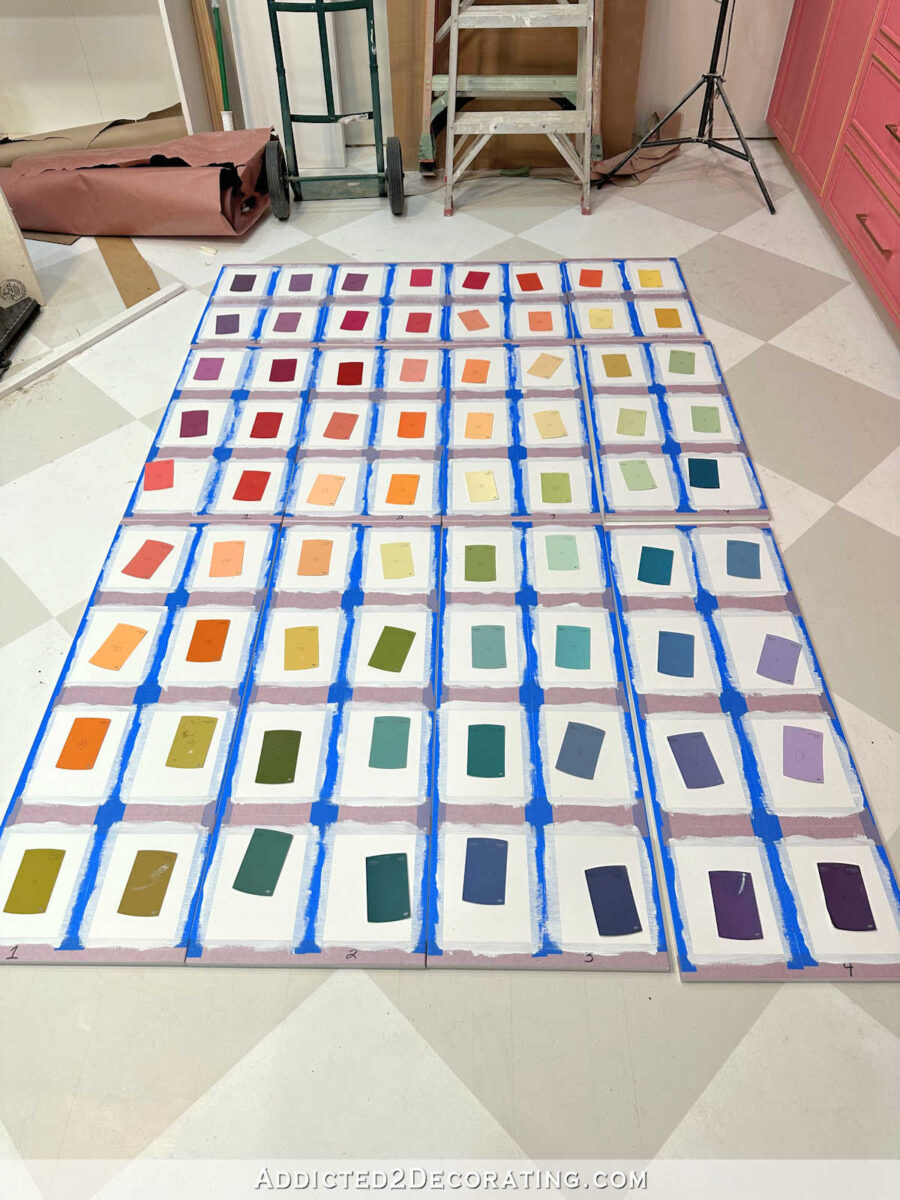
And then before I painted each door, I wrote the color number on the tape above each rectangle. I painted the colors with a 1.5″ angled brush, and each rectangle required two coats of paint. I actually had three rectangles (the most saturated colors) that required three coats, but the rest only needed two. The photo below only shows one coat of paint on those three rectangles.

As soon as I finished painting the second coat on the rectangles, and while that second coat as still wet, I removed all of the tape from the door.
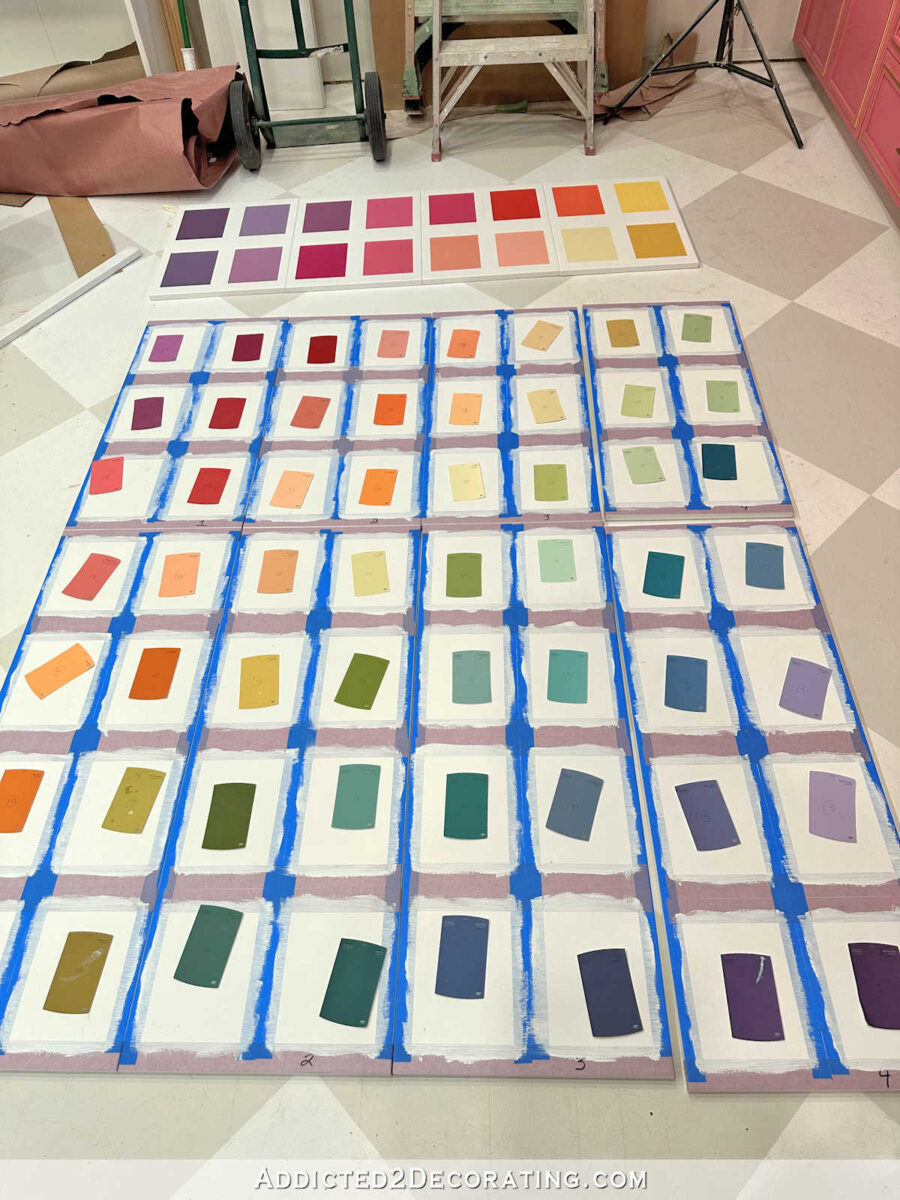
I actually thoroughly enjoyed this process. It was fun and relaxing, and I got to play with lots of color. What’s not to enjoy? And it was very satisfying to see the progress as the tape was removed from each new door and those precise little rectangles were revealed.
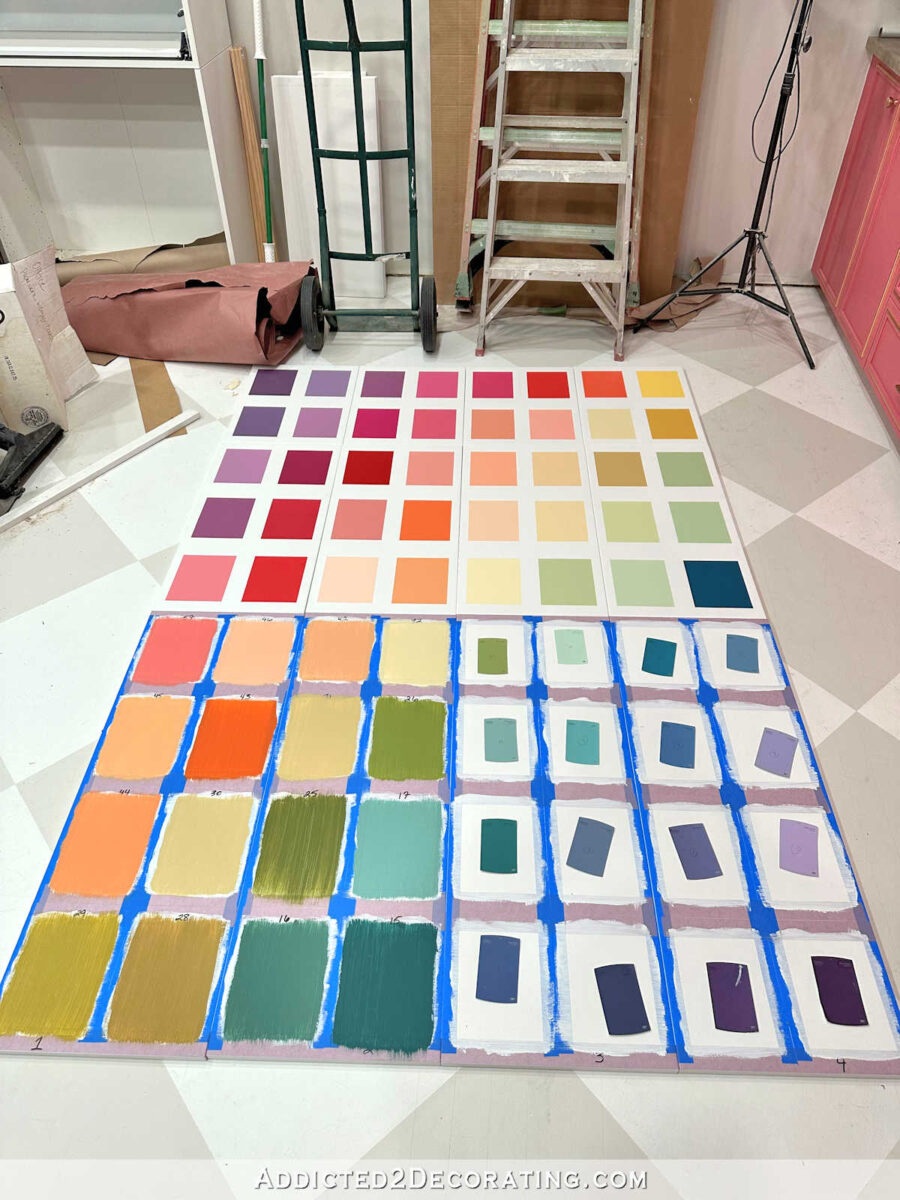
And here’s how they all looked with two coats of paint on each rectangle, all the tape removed, and the doors placed back in order. I could stare at that all day long.

Once all of the doors were painted and dry, I applied one coat of my favorite clear coat — General Finishes High Performance Clear Coat in a flat finish (affiliate link). The reason I clear coated it at this point is because I had still planned to hand label the paint colors, and Sharpie marker doesn’t work well directly on latex paint, so it’s better to seal the surface first.
But then I started practicing my handwriting, and realized very quickly that there’s no way I’d be satisfied with hand labeled swatches. I just don’t write much anymore. Everything we do these days is on the computer or phone, so while I used to love my handwriting, it just looks sloppy to me now, like I’m out of practice. I tried all caps, upper and lower case, cursive. There was just no way I was going to put any of those on my freshly painted, perfectly precise paint swatches.

So then I had to scramble for a new idea. I thought about rub on transfers. Can you even make your own? I found out that you can, but that option didn’t seem reasonable. And then I decided to pull out my trusty label maker and see if I could make that work.
Honestly, I didn’t have high hopes that it would work. But I didn’t want to write off the idea until I actually gave it a try. This is an older Brother label maker, and it’s not made anymore. This is the updated (and fancier) version of what I have (affiliate link). So I put the biggest tape in it (3/4″), and set it to the largest font possible, and gave it a try.

I thought the size and font were perfect, and I loved the clean, consistent look. But I was still cautiously optimistic because the labels were very shiny, which made them very obvious.
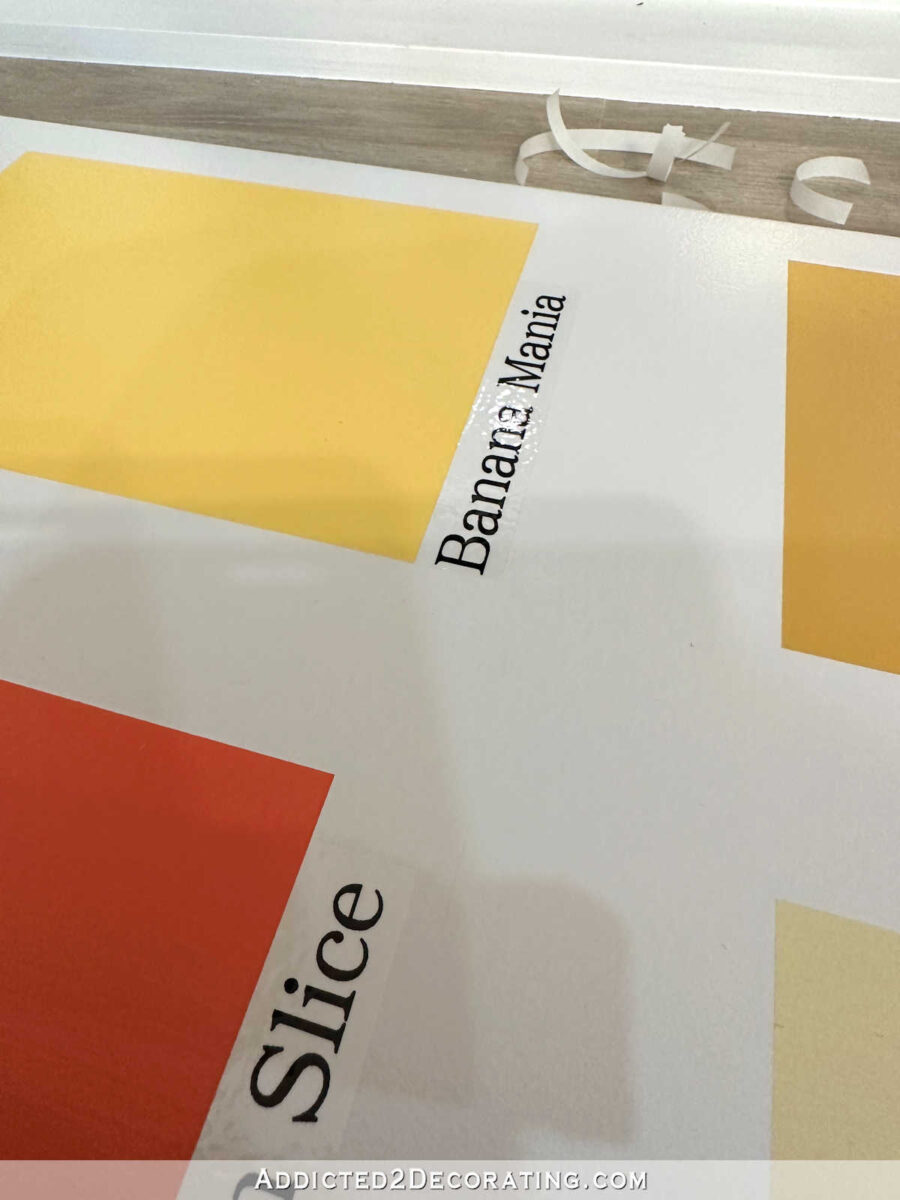
I wanted to try putting the General Finishes flat clear coat over the labels to see if I could make that shine go away, but I was concerned that the wetness of the clear coat would seep under the edges of the labels, ruining the adhesive, and causing the edges to lift. But I wouldn’t now until I tried. And I’m so glad I did, because it worked!
It took two coats of clear coat (which I applied with a four-inch roller and 1/4″ nap roller covers for smooth surfaces (affiliate link)) to hide the shine of the labels completely and make them the same sheen as the doors, but it actually worked. The wetness of the clear coat didn’t affect any of the labels at all. Not a single one.

This was so much fun to do, and to see it all come together as I finished each door.

I did run into a bit of a snafu because I carelessly placed one of the doors upside down and didn’t catch it before I picked up that door to label the colors and clear coat the door. Can you see the out-of-order door below? It sticks out like a sore thumb to me in the picture, but for some reason, I didn’t catch it as I was actually working on the doors.
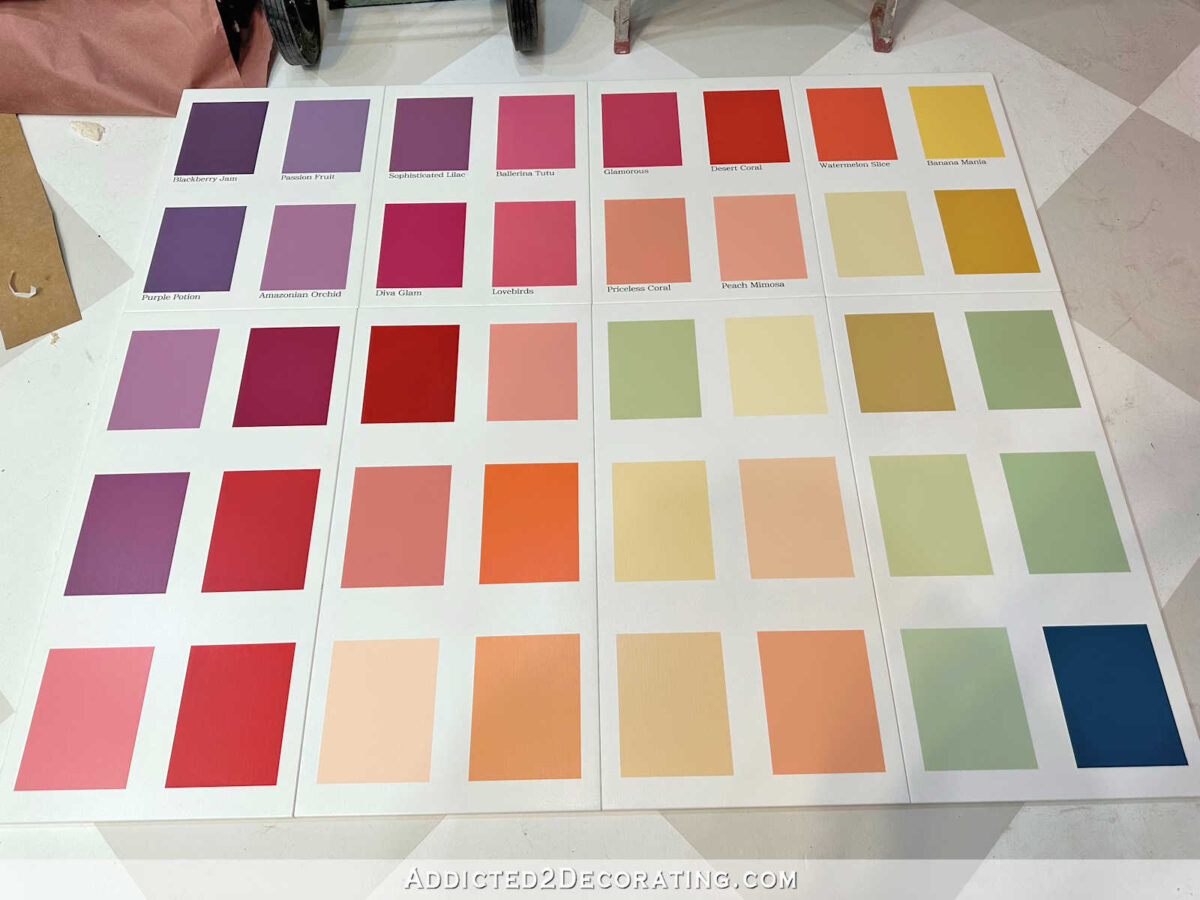
So last night, when I had finished all of the doors (all of the labels, two coats of clear coat on all of the doors) and everything was dry, I started placing the doors back on the floor in order, and I could not figure out what the heck was going on. I originally placed them so that all of the labels were the right direction (obviously), but the colors didn’t look right. I thought, “Why is that random green in the middle of all of the orange and yellow? Oh my gosh! Did I paint those colors it the wrong order? Am I going to have to sand that whole door down and start over? How did I not see that before now?!“
It took me a few minutes to clear the confusion and finally realize what was going on. I had turned the door upside down and put the labels on the wrong side of the paint swatch rectangles. UGHHH!!!

Fortunately, it was quite an easy fix. I was able to get use a razor blade and carefully peel the clear coated labels off without causing any damage. Then I just had to do a little bit of sanding with some 220-grit sandpaper to smooth out the clear coat edges that were left around the area where the label had been, make new labels, attach the new labels (on the correct side this time), and give the door two more coats of the clear coat. Crisis averted. I absolutely love how these doors turned out!!
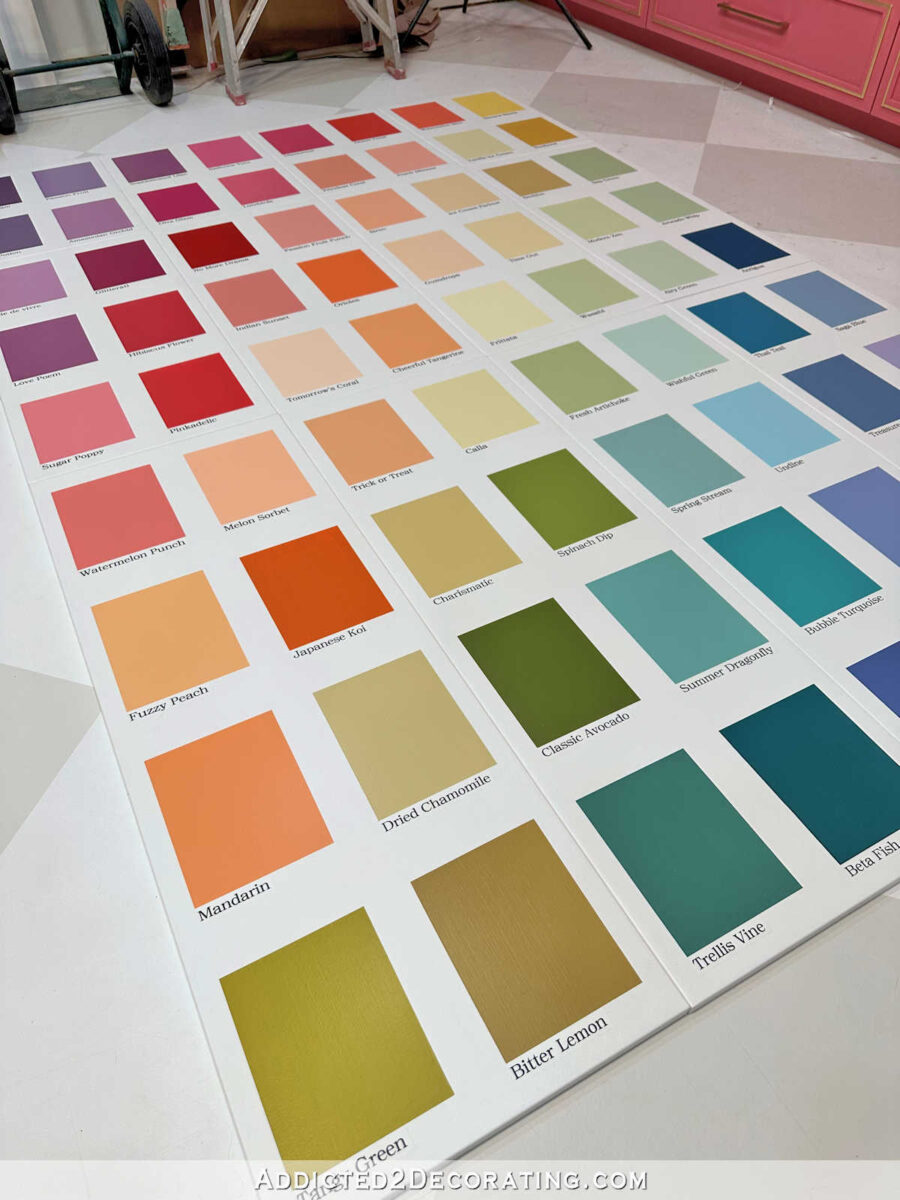
I’m not even joking when I tell you I could waste away my entire day staring at these beautiful colors. I’m not going to tell you how much time I’ve spent just this morning looking at these doors. It’s embarrassing. 😀

I mean, I can’t think of anything more perfect for my studio than a massive cabinet covered in 72 different paint colors. (Actually, it’ll be 73 by the time it’s finished, but more on that later.)
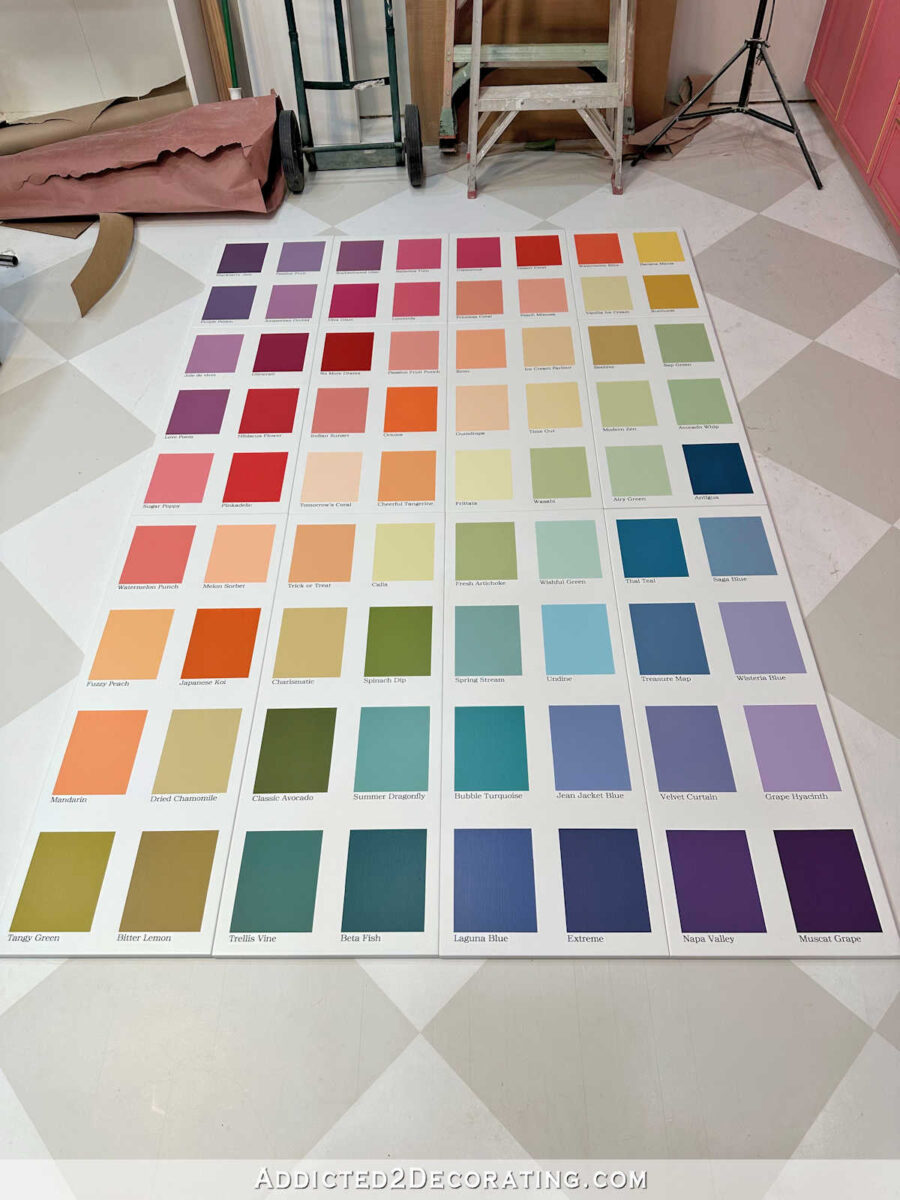
The only thing better would be a cabinet with MORE colors. 100 colors. 120 colors. All of the colors. But 72 colors will work just fine. 😀
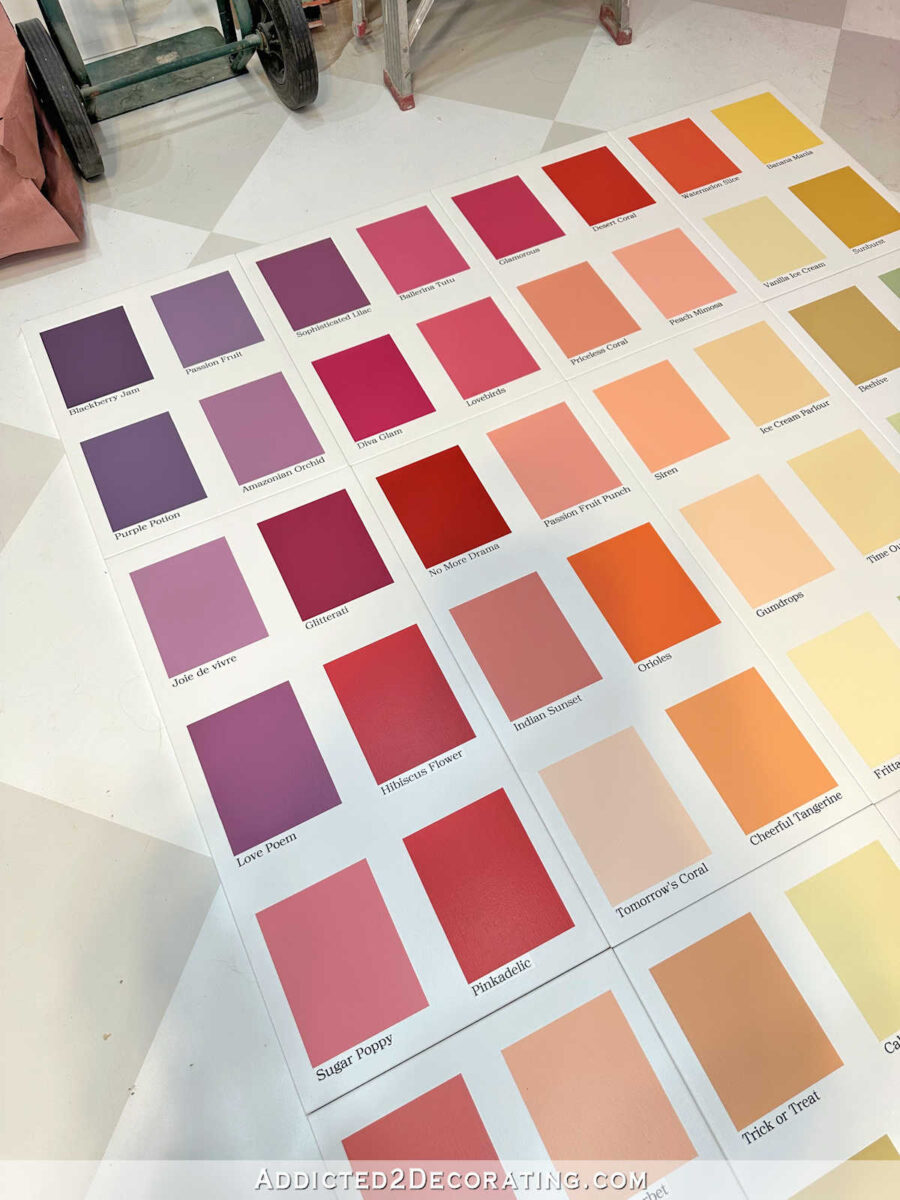
This turned out way better than I thought it would. And I think even if it is visible from the main rooms of our house (which it will be), it’ll still look great with its clean, organized look. My main concern with the more freehand paint + handwriting look is what it would look like from the entryway, living room, kitchen, and breakfast room. But this? I’ll be proud to show this off from any room in the house.
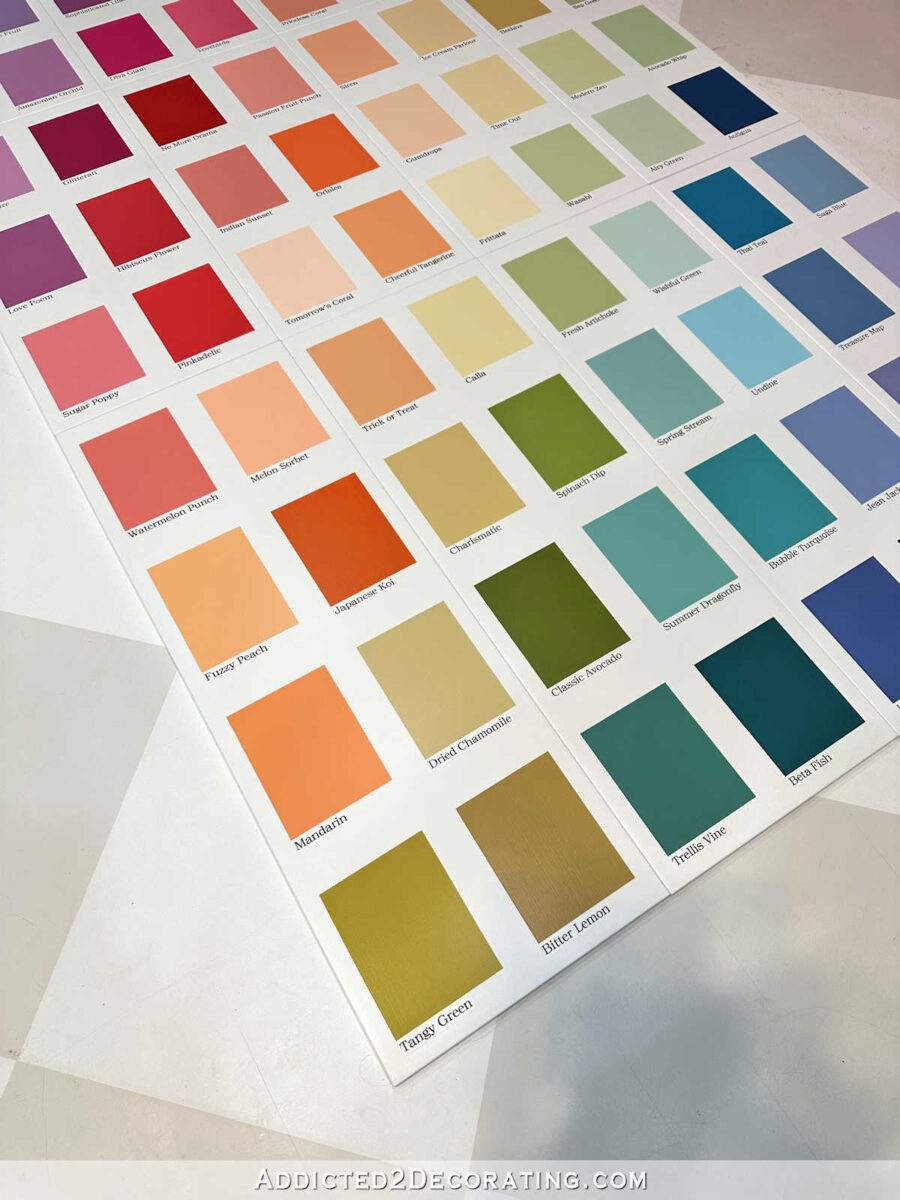
And while I did mix 33 of the colors myself, the colors I ended up with were pretty close to the Behr colors. A lot of them were pretty precise. So I just stuck with all of the Behr names rather than making up my own. So all 72 of these paint color names are actual names of Behr paint colors.

And you’ll also notice that I ended up making a few changes to the order of the greens. As many of you pointed out, I had a dark green that stuck out like a sore thumb and seemed out of order. So I swapped the greens around so that they flowed better, and that dark green was closer to the bottom rather than the middle.

And that’s it for the paint swatch cabinet doors. They are finished! Now the actual cabinet boxes need a little work, and I can check this project off of my “to do” list.

Addicted 2 Decorating is where I share my DIY and decorating journey as I remodel and decorate the 1948 fixer upper that my husband, Matt, and I bought in 2013. Matt has M.S. and is unable to do physical work, so I do the majority of the work on the house by myself. You can learn more about me here.


